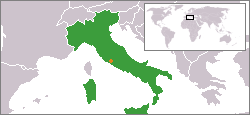Apostolic Nuncio to Italy
 |
|
|
Italy |
Holy See |
|---|---|
Holy See–Italy relations refers to the special relationship between the Holy See, which is sovereign over the Vatican City, and the Italian Republic.
Relations with the Kingdom of Italy were difficult during the papacies of Pius IX and Leo XIII, who had to endure the status of prisoner of the Vatican after the capture of Rome. Leo XIII forbade Christians from participating in elections and accused the Italian state of being controlled by freemasons.
It was only under Pius XI that the Lateran Treaty was signed, establishing the State of Vatican City, allowing for greater papal autonomy. Under Pius XII and Paul VI, Christian Democracy parties thrived and had great influence on Italian politics. The pope is recognized as a kingmaker in Italian politics, as demonstrated with the papal influence in the rivalry between Silvio Berlusconi and Romano Prodi.
Due to the size of the Vatican City State, embassies accredited to the Holy See are based on Italian territory. Treaties signed between Italy and the Vatican City State permit such embassages. The Embassy of Italy to the Holy See is unique amongst foreign embassages in that it is the only embassy based on its home territory.
The Holy See maintains formal diplomatic relations with 176 sovereign states, the European Union, and the Order of Malta; 69 of the diplomatic missions accredited to the Holy See are situated in Rome, though those countries then have two embassies in the same city, since, by agreement between the Holy See and Italy, the same person cannot be accredited simultaneously to both.
...
Wikipedia
